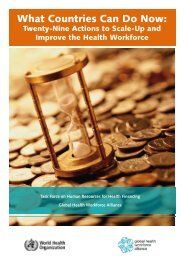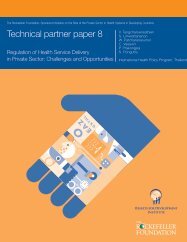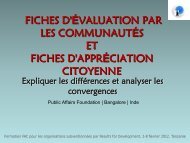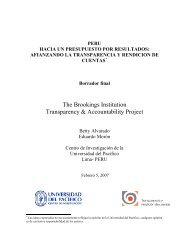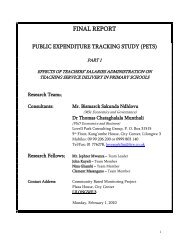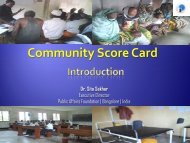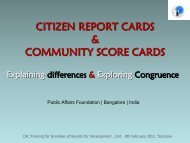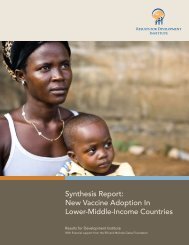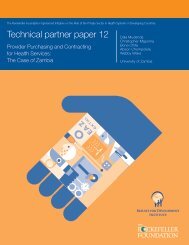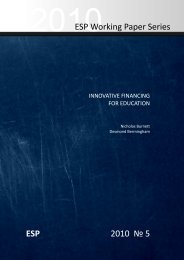Innovative Secondary Education For Skills Enhancement
Innovative Secondary Education For Skills Enhancement
Innovative Secondary Education For Skills Enhancement
Create successful ePaper yourself
Turn your PDF publications into a flip-book with our unique Google optimized e-Paper software.
Executive Summary<br />
The <strong>Innovative</strong> <strong>Secondary</strong> <strong>Education</strong> for <strong>Skills</strong> <strong>Enhancement</strong><br />
(ISESE) project, supported by the Rockefeller Foundation,<br />
seeks to identify the skills required for work in the<br />
21st-century economies of Africa and Asia, and to explore<br />
innovative models of delivering those skills to youth<br />
of secondary school age. The Results for Development<br />
Institute (R4D) worked with regional partners in both<br />
regions to uncover new findings, and also scanned existing<br />
research and work in this area. This synthesis paper summarizes<br />
the background studies on skills for employability<br />
that were produced as part of this research, and is complementary<br />
to a parallel synthesis paper exploring innovative<br />
models for skills enhancement at the secondary level.<br />
<strong>Secondary</strong> education is now the level of education from<br />
which most people enter the labor force (the exception<br />
is Africa, where secondary school enrollment rates are<br />
growing rapidly but still remain at less than 40 percent).<br />
Yet secondary education remains largely conceptualized as<br />
an interim step for the elite en route to higher education.<br />
Three aspects of secondary education skills are examined:<br />
the link between skills and individual livelihoods and economic<br />
growth; employer expectations regarding skills; and<br />
the specification of skills in the curriculum. Broadly speaking,<br />
three different types of skill are important: cognitive,<br />
non-cognitive (behavioral and attitudinal), and technical.<br />
The economic research evidence is increasing that<br />
cognitive skills are directly related to individual earnings<br />
and broader economic growth; there is not as yet much<br />
evidence about non-cognitive skills; and technical skills<br />
only seem to make a difference for initial employment but<br />
not thereafter, an important finding as technical education<br />
is so much more expensive per student than general academic<br />
secondary education. Employers are as concerned<br />
about non-cognitive skills as they are about cognitive<br />
and technical ones, and while there are some regional<br />
and sectoral differences, those are not as important as<br />
this broader finding. Non-cognitive skills are much more<br />
important for the informal sector than previously realized.<br />
Curricula rarely specify non-cognitive skills; where they<br />
are included, it is not in a way that is helpful to teachers in<br />
understanding what employers are looking for.<br />
Glossary<br />
21st-century skills: These are the skills that are<br />
particularly important for work in today’s global, 21stcentury<br />
economy. They include core subjects, life<br />
and career skills, learning and innovation skills, and<br />
information technology skills. Many of these skills are also<br />
often collected together into various packages of life skills<br />
that are considered important.<br />
Cognitive skills: These are the basic mental abilities we<br />
use to think, study, and learn, and include numeracy and<br />
literacy.<br />
Non-cognitive skills: Non-cognitive skills refer to<br />
personality traits and behaviors, and include leadership,<br />
communication, and reliability. These are also called soft<br />
skills, or behavioral skills.<br />
Technical skills: These are the skills geared toward<br />
a specific occupation. They include electrical wiring,<br />
plumbing, and diesel machinery.<br />
Informal economy: The International Labor<br />
Organization definition is used in this paper. It refers to<br />
all economic activities by workers and economic units<br />
that are—either in law or in practice—not covered or<br />
insufficiently covered by formal arrangements.<br />
6 <strong>Innovative</strong> <strong>Secondary</strong> <strong>Education</strong> <strong>For</strong> <strong>Skills</strong> <strong>Enhancement</strong> (ISESE)



